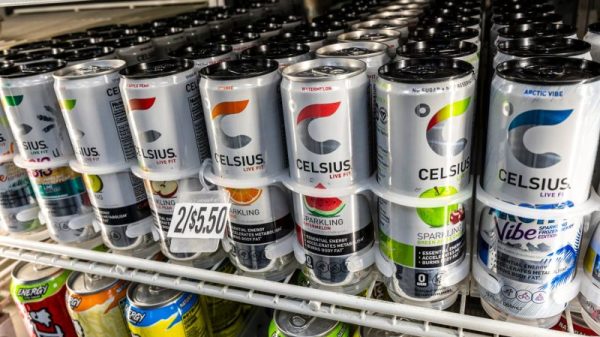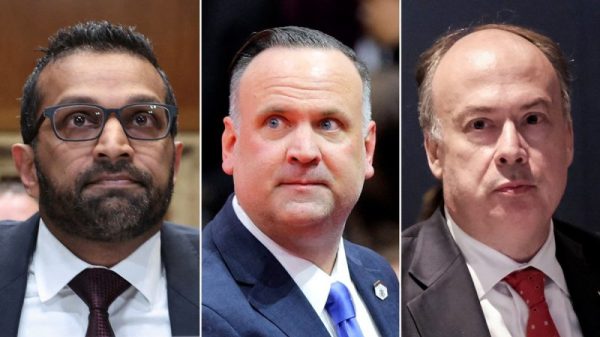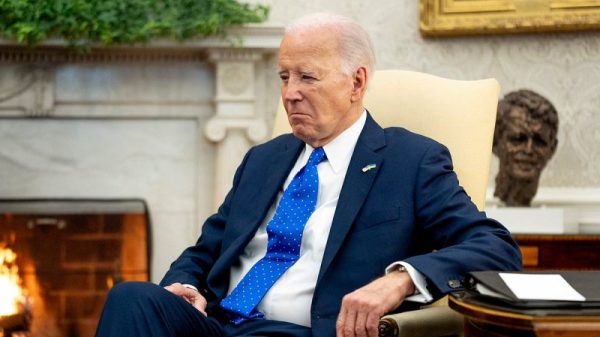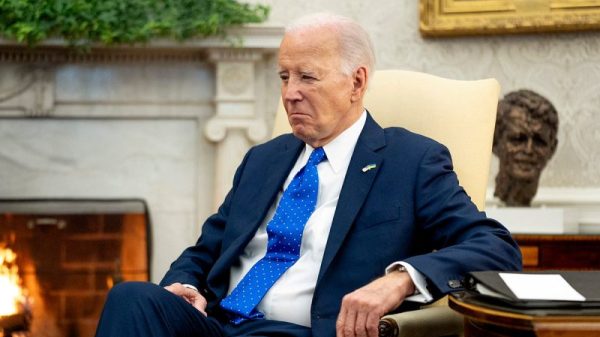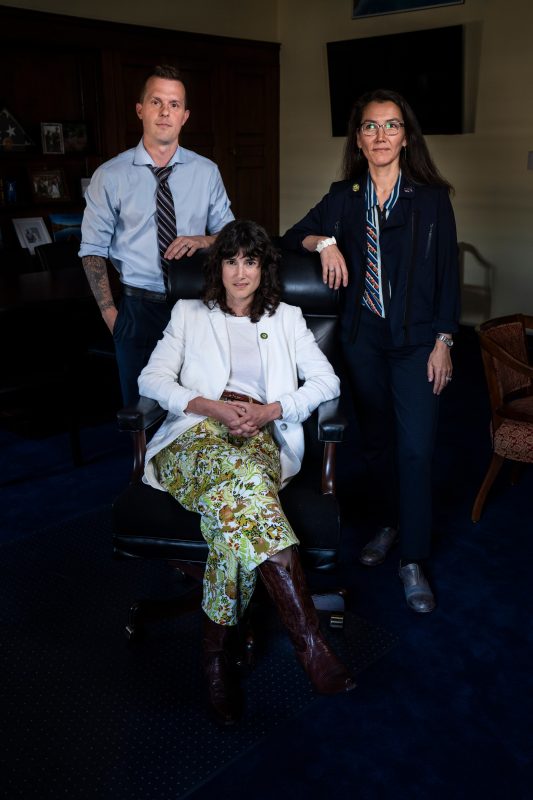Rep. Jared Golden (D-Maine) has never really been into labels.
His liberal colleagues have called him a conservative and unreliable partner in the Democratic cause. Republicans have targeted him as an extremist, too tied to the party line.
But to Golden, and many Mainers, he’s a little bit of everything. A constituent once called him a “progressive conservative Marine.” And if he ever has doubts about the political path he’s taken, he looks at a thank-you note from a constituent that he keeps in his congressional office.
“Please know that you have been able to unite my (very large) politically divided family,” the card reads. “Your dedication and hard work are greatly appreciated.”
Not fitting squarely into a box has often been a lonely endeavor for Golden. But following a pair of shocking wins last year in reliably conservative districts often ignored by Democrats, freshmen Reps. Mary Peltola (D-Alaska) and Marie Gluesenkamp Perez (D-Wash.) have joined forces with Golden in taking over the once-powerful Blue Dog Coalition.
The Blue Dog Coalition at its peak boasted 70 members, made up of more moderate Democrats who focused on fiscal stability, national security and working across the aisle to reach common goals — ideals that often led them to spar with the majority of their colleagues who have slowly inched further to the political left. Now, the three young leaders are hoping they can recruit more like-minded candidates, reestablish the power of the group now made up of just 10 lawmakers and challenge the idea that Democrats’ fundamental values can attract only a particular set of voters.
“I think it’s about creating a caucus where you’re free to represent your district and still be a Democrat because of the shared values that we still have with everyone else in our caucus, despite our differences,” Golden said during a joint interview with Gluesenkamp Perez and Peltola in his office last month.
This new generation of leaders — all three are younger than 50 years old and two are women of color — are hoping to change how the Blue Dogs are perceived within the broader caucus. While members of the group are more socially liberal than the lawmakers who founded it 30 years ago, the group as a whole has often been seen as a home for agitators who push for restrictive policies many deem out of touch with the mainstream Democratic Party.
The trio argues that their wins should be seen less as an affront to the party, but instead as an example of how Democrats can expand the electoral map and regain their reputation as a “big tent party.” They all bring the perspective of having won in districts carried by President Donald Trump in 2020. (Peltola even hails from a district Trump won by double digits.)
“I do not think that, at its core, the trades community and rural communities are truly in the long term as well-served by modern Republican ideology. I believe it really is the Democratic Party that, in our history, believed in your rights to organize, the dignity of work,” Gluesenkamp Perez said.
“Those are the things that we want to see return. It’s not just about flipping seats for us. It’s about the long work of turning the train around and getting back to place-based politics and not focus grouped, Twitterati agendas.”
Trying to maintain a robust membership has been an ongoing problem for the Blue Dog Coalition.
Democrats representing conservative-leaning districts established the group in 1995 in response to Republicans regaining the House majority for the first time in roughly 40 years. It reached peak membership during the 2008 election with roughly 70 members, but it saw its numbers slashed by more than half during the 2010 midterms after vulnerable incumbents who voted for the Affordable Care Act — even though they knew it would be politically perilous — lost their seats.
The more nuanced way the co-chairs have been talking about their vision for the party and their roles in representing that constituency has begun to resonate with a handful of first- and second-term lawmakers — most of whom also reside in swing districts — who are considering becoming a Blue Dog this year, they said.
“There are people that are coming to us and I would warn, I guess, that we’re going to be bigger before the next election,” Golden said.
Potential growth among the Blue Dogs is not something that Democrats thought would necessarily happen after six lawmakers left the group earlier this year. The group was fractured by a desire among some to change their name to the Common Sense Caucus, which members argued would help recruitment. By shedding the Blue Dog name, and its reputation that alludes to its founding days as an old school, largely Southern boys club, the concerned lawmakers argued they would attract more interest.
The effort failed and the departure of those six lawmakers left just seven members, including Golden, who were all men. Golden then started reaching out to new Democratic lawmakers who he knew represented districts similar to his and were okay with breaking with party leadership at times. In joining the group, Peltola, Gluesenkamp Perez, and Rep. Wiley Nickel (D-N.C.) boosted its membership to 10.
“We want to be the caucus that gets stuff done, and that’s what I associate with. It doesn’t do me any good to be here to be an ideologue,” Peltola said.
Though they had less than 20 lawmakers in the group last term, they proved they could not be ignored as House Democrats had only a five-seat majority.
Blue Dog members often were at odds with the almost 100 lawmakers in the Congressional Progressive Caucus, in particular casting doubt on whether the $3.5 trillion social spending package, known as Build Back Better, would become law. The Blue Dogs played an instrumental role in decoupling the large package from passing alongside the infrastructure bill, which Golden said gave Republicans the green light to support the measure and make it a bipartisan accomplishment for the Biden administration. And as they predicted, the more targeted Inflation Reduction Act — instead of Build Back Better — later passed both chambers.
While being in the House minority gives them time to reassemble, the group has found itself playing a proactive role. Earlier this year, they called on the Biden administration to negotiate with Republicans on a debt ceiling deal before it dominated politics in Washington, and they have already begun to raise alarms on the possibility of a government shutdown in the fall.
Golden, Gluesenkamp Perez and Peltola have garnered a reputation as lawmakers most likely to vote with Republicans, which Democratic leaders recognize as necessary for the trio to maintain support in their districts. That has not stopped the liberal base from focusing their ire on the group, viewing them as Democrats in name only. The New York Times reported that Gluesenkamp Perez’s auto repair shop became the target of online attacks after she was one of two Democrats who voted against Biden’s student debt forgiveness initiative. The other Democrat was Golden.
“I think it’s also important, like, we are not trying to win a popularity contest. We are trying to represent our communities and our values,” Gluesenkamp Perez said.
The three have stayed away from partisan attacks and kept their focus on attracting more members to join their ranks. They have begun to speak more actively about what the group stands for, having conversations on the House floor or sitting down to breakfast with members interested in joining. While they are sticking to their fiscal stability and national security roots, they are working to define what those principles can mean in this modern political environment — arguing that tackling supply chain reforms, strengthening cybersecurity and addressing the growing housing issue all fall under those two categories.
The Blue Dogs also want to address climate change by supporting more alternative energy measures. But they say Democrats have often missed the nuance of the conversation by siding with liberals who push for immediate change and criticize moderates — and in turn, the communities they represent — when they push back against the all-or-nothing perspective on policymaking.
Peltola notes that while Alaskans are worried about carbon emissions and are seeking more affordable alternatives, getting those projects up and running quickly is not realistic until there is a skilled workforce to build and maintain them.
“We care about things that are tangible to working families, growing the middle class, helping the middle class. That’s what I want to work on,” she said. “I really think in Alaska, the candidates who won the statewide races … we just talked about the issues and I really think that’s what Americans want right now.”
The trio also has issue with legislation that boasts huge price tags, promising funds for localities and states but tying those funds to very specific rules, like aspects of Democrats’ Build Back Better and coronavirus relief bills. They believe that approach could actually alienate working-class communities who want to implement change in the way that works best for their area.
“The Democratic Party, I think, increasingly is just about federalizing most of that stuff and dictating terms to localities about what they must do in order to receive, and almost deserve, access to this money,” Golden said. “My perspective is, I want to empower my local communities to make these decisions. They’re smart enough to do it themselves. They’re capable to do it themselves.”
While the Blue Dog co-chairs are looking to influence policy debates by expanding their ranks in the short term, they know that their broader goal of changing how the party defines base politics requires two things: Recruiting more candidates like them and helping them get elected.
“Trying to change culture with legislation is sort of like trying to push with a rope,” Gluesenkamp Perez said. “I think that part of what we’re doing here is to change the culture of Congress, to challenge the narrative of what it means to be a qualified candidate or legislator.”
Unlike previous years, the Blue Dog Coalition and its political arm are looking to play a proactive role in recruiting candidates rather than just supporting politicians once they’ve announced their campaigns. And they have a triad of characteristics for candidates they deem worth investing in: a Democrat working in a rural or working-class district that leans conservative; someone who is willing to challenge rather than walk the party line; and someone who will likely face a Trump-loyalist Republican.
While there are a limited number of races that would hit all three categories, the co-chairs are looking at districts across the country. So far they said they have been in touch with prospective candidates in Colorado, Wisconsin, Florida and Pennsylvania.
All three are familiar with the herculean task of running as a Democrat in a reliably conservative district, as unknown politicians are usually not given financial backing by the Democratic Congressional Campaign Committee (DCCC), which remains focused on helping candidates who are challenging Republican incumbents representing districts Joe Biden won in 2020.
Gluesenkamp Perez recalled visiting the DCCC offices in Washington shortly after she beat far-right candidate Joe Kent, flipping a GOP-held seat for the first time in over a decade. She noticed that her face was missing on a map of the country that showed competitive races. She ribbed staff, telling them, “Oh, you spent more money on printing that damn map than you did on my race.” The small-business owner said she was largely able to sustain a campaign because of small-dollar donations and a law change that allowed child care to be included as a campaign expense.
Peltola was largely considered an afterthought when she ran to represent Alaska’s at-large congressional district, which Trump won by 10 points in 2020. She joked that she accepted one of her kid’s requests to help babysit in Oregon because she had “a one in 3 million chance” to win the race after raising only $400,000 in her special election against three millionaires.
But she said she believes she overperformed in her races because “people are tired of hearing the bumper sticker rhetoric. People are tired of this kind of garbage that most candidates feel like they have to say.” Peltola said she’s now “begging the Democrats” not to give her money because they didn’t before and she doesn’t want it now.
While they see candidates like themselves being successful in swing districts, their own wins have emboldened the Blue Dogs to make plays at reliable Republican districts. They would also rather oust GOP extremists in conservative-leaning districts than target moderate and pragmatic Republicans who value finding bipartisan solutions to some issues.
“That’s why the [National Republican Congressional Committee] wants our head on a platter because we break the map. I don’t want to reduce it to partisan football, but I, at my core, believe that communities like ours are best served by normal people with Democratic values,” Gluesenkamp Perez said. “We lose the soul of the Democratic Party, when we say, ‘You know what, we’re gonna go after college-educated Republicans instead of blue-collar union members.’ … We lose the values that hold us together.”
While DCCC staff often meets with all three Democratic ideological caucuses — the Congressional Progressive Caucus, New Democrat Coalition and Blue Dog Coalition — on recruitment, the trio believes that the national campaign arm and the new generation of House Democratic leadership have a choice to support candidates not typically out of central casting this cycle and in the future.
“I really believe that we can [take the House back] at a time when a lot of the party is, at times openly, throwing out the idea that we should forget about [candidates like us],” Golden said. “It should be looking for the most qualified person to represent the community who is a Democrat … and bring the resources to them.”










